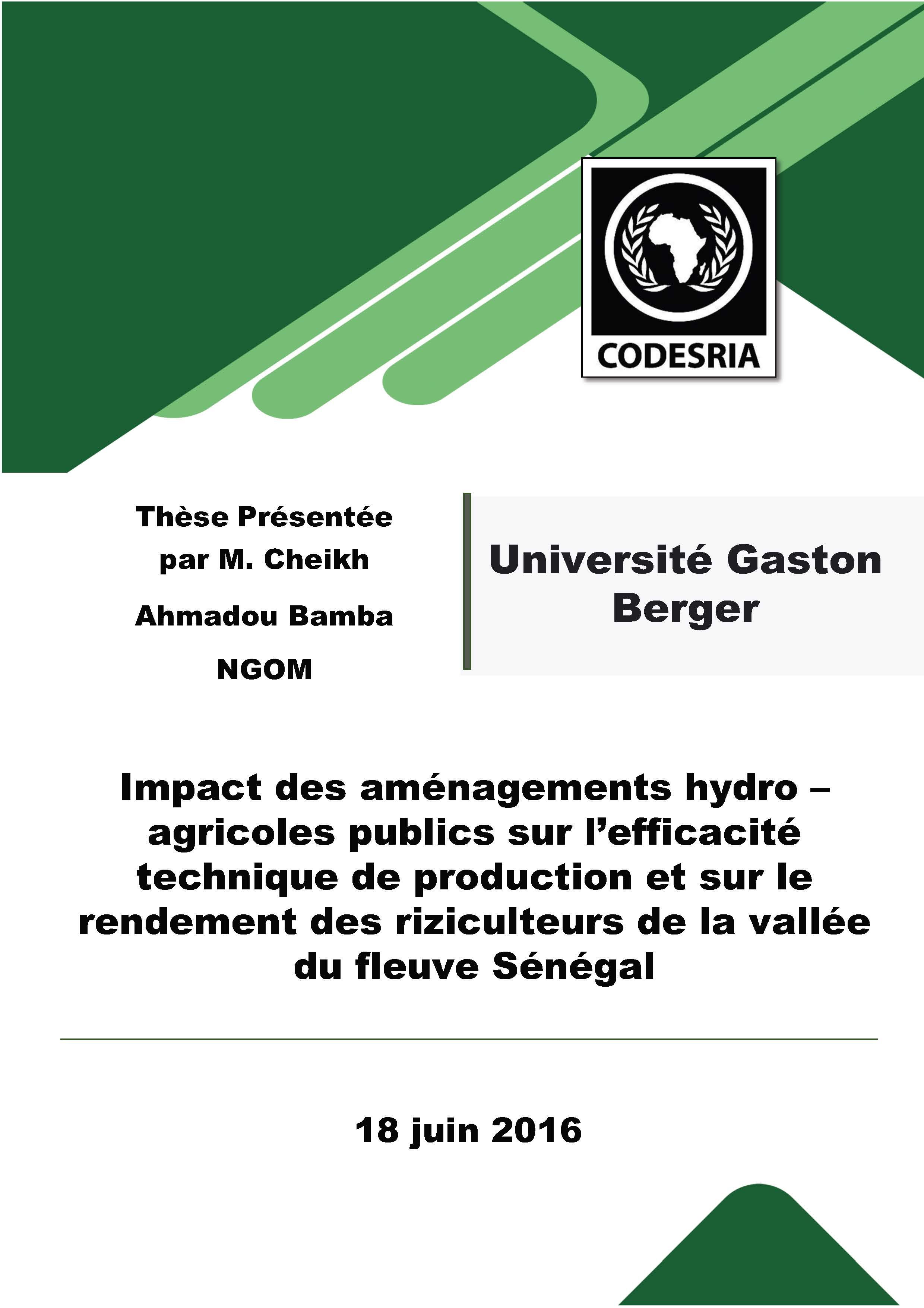Impact des aménagements hydro–agricoles publics sur l’efficacité technique de production et sur le rendement des riziculteurs de la vallée du fleuve Sénégal
Keywords:
technical efficiency, rice yield, hydro – agricultural settlements, Senegal River valley, impact assessmentSynopsis
Senegal, one of the biggest consumers of rice in West Africa, imports a large portion of its rice. The domestic production of rice can satisfy approximately two or three months of consumption per year. In order to solve this deficit, the Government has expended efforts in the Senegal River valley especially in providing settlements to increase the production means of the rice producers so as to enhance the production volume. This thesis aims at checking out what is the contribution of cultivating in a public settlement on the rice farmers’ technical efficiency and on their rice yield in the Senegal River valley. Firstly, by a frontier production function estimation, it’s found out that the technical efficiency of the sample ranges from 14 to 100 % with an average of 70 %. The efficiency determinants analysis shows that the location (department of the producer), the gender, the household size, the education level, the ethnicity, the distance between the plot and the house, the number of plots owned by the producer are statistically significant. The main focus of this study gives evidence that farming in a public settlement provides an average effect of 4.91 % on the technical efficiency and 422 kg per hectare on the rice yield of those operating in these perimeters. The technical efficiency determinants analysis from an exponential function estimation, using a nonlinear
least squares method, reveals that, besides the treatment taken apart, the combined effects between this one and the distance from the house to the plot, the education’s level, the household size, the gender are statistically significant on efficiency. Regarding the rice yield, except the gender and the household size which are ruled out from this estimation, all the
variables cited earlier records significant coefficients. In terms of economic policy implications, it’s suggested: (i) The Government shouldn’t give up the way of the settlements conception and management to the private sector; (ii) it also has to be in charge of the rehabilitation of these settlements and the maintenance of the hydro – agricultural equipment because the old age of these one over the years decrease their performance; (iii) it is important to revisit the plots distribution system referring to the household chief status so that to improve the land access to women; (iv) the implementation of a Support Fund for the Research and the Extension of the Results’ Research would strengthen capacities of Research and Extension Services to address many issues in the in the rural areas.
Downloads
References
Pinstrup – Andersen P and S. Shimokawa (2006), Rural Infrastructure and Agricultural Development, Cornell University, Paper prepared for presentation at the Annual Bank Conference on Development Economics, Tokyo, Japan, May 29-30, 2006, pp 1 – 39.
Poussin J. C, Y. Diallo et J. C. Legoupil (2005), Gestion collective et productivité des périmètres irrigués villageois, Actes du séminaire Euro-Méditerranéen, Novembre, pp 1 – 22.
Programme d’appui aux Initiatives du NORD (2007), Charte de Qualité du Riz de la vallée du Fleuve Sénégal, mars, pp 1 – 67.
Programme des Nations Unies pour l’Environnement (2005), Evaluation intégrée de l’impact de la libéralisation du commerce : Une étude de cas sur la filière du riz au Sénégal, pp 1 – 91.
Puig-Junoy J. (2000), Technical inefficiency and public capital in U.S. States: a stochastic frontier approach, Department of Economics and Business, Pompeu Fabra University C/ Ramon Trias Fargas 25-27, 08005 Barcelona, Spain, pp 1 – 35.
Puig-Junoy J. and J. Pinilla (2008), Why Are Some Spanish Regions So Much More Efficient Than Others? pp 1 – 28.
Quatrida D. (2009), La SAED face aux privés : problèmes et perspectives de l’agriculture irriguée dans le Delta du fleuve Sénégal, dans Egidio Dansero, Enrico Luzzati, Sidy Mouhamed Seck sous la direction de Organisation paysanne et développement local, leçon à partir du cas du Delta du fleuve Sénégal,l’Harmattan Italia, février, pp 53 – 76.
Ravallion M. (2005), Evaluating Anti – Poverty Programs, Development Research Group,World Bank, pp 1 – 90. République du Sénégal (1995), Programme d’Ajustement Sectoriel Agricole, Lettre de Politique de Développement Agricole, avril, pp 1- 39.






